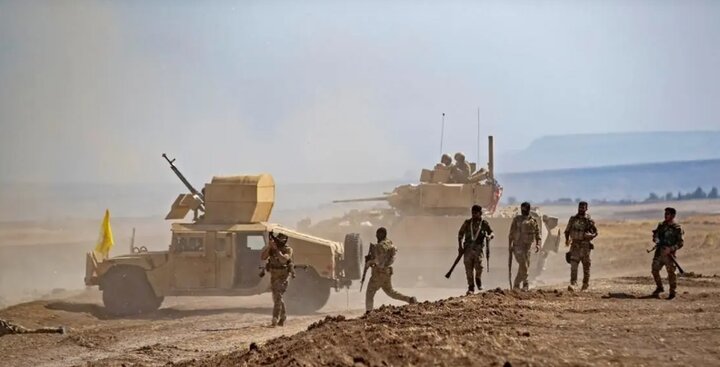Where does the conflict between the “partisan” and the “Julani” regime come in the light of political challenges?

“Saba-backlink” href = “https://www.mehrnews.com”> Mehr News Agency , International Group : Make a clear and transparent decision on how to run northern Syria on both eastern and western sides This is because groups of Kurdish militias have long been in control of several cities and villages in the region. Military control of the Kurdish regions in the hands of the Kurds is an important challenge for the Golani terrorist regime. In addition to military control, the Kurds also have oil resources, and until just a few days ago, they have been involved with Turkish -backed Arab and Turkmen groups.
There is no detailed information on the number of militants called “Qasd”, but some Turkish publications and news agencies such as Sabah Daily and Anatolian State News Agency announcement It has been that “Qadd” has about 6,000 people, and at least one fifth of all of its people, under the supervision of US officers, have received military training.
Turkey; Crisis Agent
Turkey as a country that has a 2-kilometer border with Syria, became part of the crisis for five years and more than 6,000 people. He armed Assad to the conflict. Ankara also allowed terrorists to enter Syria from dozens of foreign countries from Turkish border provinces such as Chlorine, Adana, Chanley Orfa and Ghazi Antab. In addition, Turkey has repeatedly attacked the Kurdish areas and has occupied Afrin and several other areas in the western Euphrates for years.
from Ankara, Kurdish militias called “al-Qaeda” as well as a group called “People’s Defense Units” (YPG), all group and organizational sequences of the Workers’ Party Kurdistan (PKK) and must be treated as a terrorist group. However, Washington does not have such a view and has used the part in its goals as an armed mercenary. This has become one of the most important political and security differences between Ankara -Washington. The United States, who has supported Kurdish militias and military equipment from the beginning of the Syrian crisis and during the Trump and Biden era, and has provided weapons and military equipment.
why is the disarmament of complication complicated?
statements by some Zionist regime officials as well as some US officials have shown that the two sides are seeking support but still unclear At what level and size this support will be. As expected, Turkish officials are concerned about the current trend and want to clarify the task as soon as possible.
Iraqi Kurdistan-based TV report shows that the oppressed Abdi visit to Erbil and his visit to Democratic Party leader Massoud Barzani also related to Turkish threats. It has been. During the meeting, Abdi called on Barzani to meditate on Ankara officials and to stop scattered military attacks on the Kurdish areas. In addition, Barzani has also advised Abdi to allow other Kurdish political groups to be armed in northern Syria. But Abdi’s response to this request was Barzani: “There is no prohibition on their activity, but they need to be members of the part and accept our conditions.”
Sheibani, who had previously traveled to Turkey as the Syrian Foreign Minister, during a meeting with Turkish President Recep Tayyip Erdogan and Turkish Foreign Minister Hakan Fidan. They assured that Damascus would not be short of part. In an interview with Al -Arabiya, Mazlum Abdi, in an interview with al -Arabiya, revealed that during a secret meeting with Mohammed al -Julani, the head of the al -Sham terrorist group, there was no talk of the Kurds’ disarmament.
Abdi also said: “We announced to them that we can handle Syria together.” Meanwhile, Saleh Muslim, another Syrian Kurdish leader close to Ocalan, has stated that, contrary to the expectation of Ankara officials, there is no issue called the dissolution and disarmament of the forces, and the negotiations must be based on the agreement and guarantee of the Kurds’ participation in the executive structure of the country. .
, however, it seems that Turkish officials are cleverly seeking to introduce Kurdish movements in northern Syria as a serious security threat. But inwardly, these claims seek financial gain, seizing the Syrian consumer market, training Syria’s military and security forces, and removing the largest share of Syrian reconstruction.
Future Trump and Erdogan
is still unclear what the final agreement or deal between Donald Trump and Recep Tayyip Erdogan on the extent of the Kurds’ influence will be in northern Syria. Perhaps this is why the US Institute of Foreign Policy Research has also commented in vague and optimistic terms about the redefinition of the American role in Syria. “Given Washington’s cooperation with Syrian democratic forces in the northeast of the country, the management of Kurdish militants with the Turkish government is an important challenge for US foreign policy,” the institute said.
The analysis reads: “The United States has to discuss current talks between the Turkish government and Abdullah Ocalan, the Kurdistan Workers’ Party leader (PKK) ) Support, because improving relations between Turkey and Kurdish groups also makes it easy to manage the Syrian case. Therefore, it is necessary to strive for a useful reciprocal relationship between Türkiye and the Syrian Kurds in US diplomacy. The first step is to stop Turkish -backed attacks on the Kurdish regions of Syria because these attacks are at risk of instability and may be so out of control that will intervene in other activists. “


